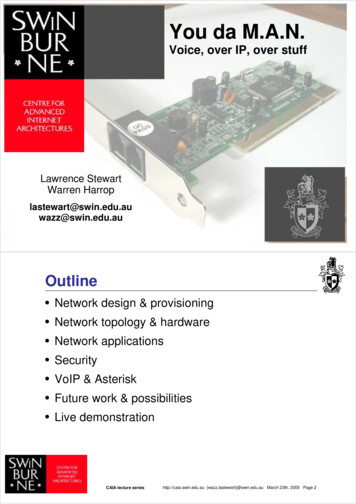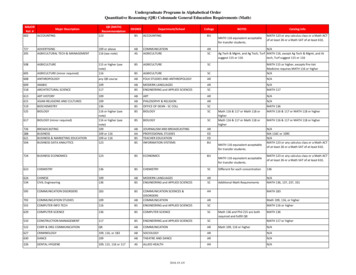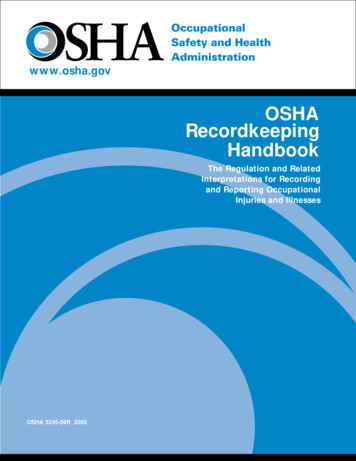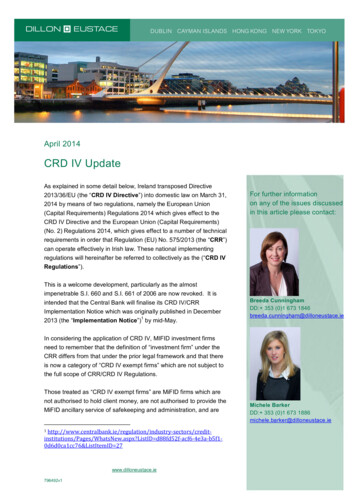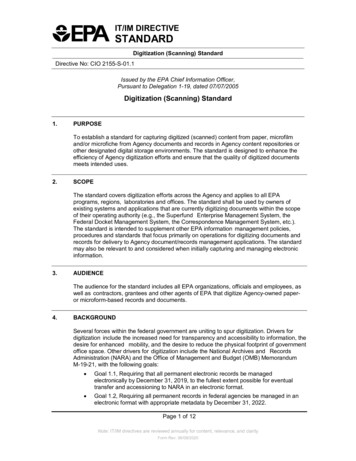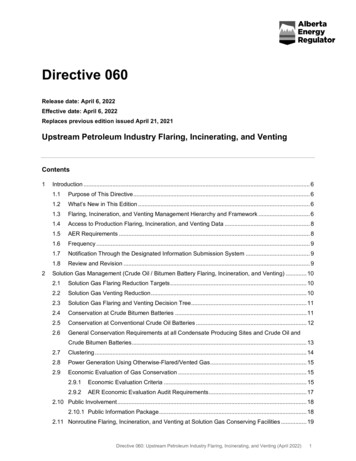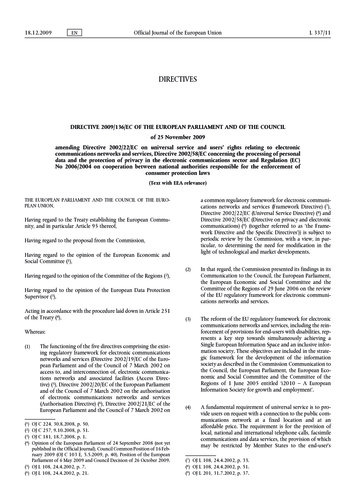
Transcription
18.12.2009ENOfficial Journal of the European UnionL 337/11DIRECTIVES DIRECTIVE 2009/136/EC OF THE EUROPEAN PARLIAMENT AND OF THE COUNCILof 25 November 2009amending Directive 2002/22/EC on universal service and users’ rights relating to electroniccommunications networks and services, Directive 2002/58/EC concerning the processing of personaldata and the protection of privacy in the electronic communications sector and Regulation (EC)No 2006/2004 on cooperation between national authorities responsible for the enforcement ofconsumer protection laws(Text with EEA relevance)a common regulatory framework for electronic communi cations networks and services (Framework Directive) (7),Directive 2002/22/EC (Universal Service Directive) (8) andDirective 2002/58/EC (Directive on privacy and electroniccommunications) (9) (together referred to as ‘the Frame work Directive and the Specific Directives’)) is subject toperiodic review by the Commission, with a view, in par ticular, to determining the need for modification in thelight of technological and market developments.THE EUROPEAN PARLIAMENT AND THE COUNCIL OF THE EURO PEAN UNION,Having regard to the Treaty establishing the European Commu nity, and in particular Article 95 thereof,Having regard to the proposal from the Commission,Having regard to the opinion of the European Economic andSocial Committee (1),Having regard to the opinion of the Committee of the Regions (2),(2)In that regard, the Commission presented its findings in itsCommunication to the Council, the European Parliament,the European Economic and Social Committee and theCommittee of the Regions of 29 June 2006 on the reviewof the EU regulatory framework for electronic communi cations networks and services.(3)The reform of the EU regulatory framework for electroniccommunications networks and services, including the rein forcement of provisions for end-users with disabilities, rep resents a key step towards simultaneously achieving aSingle European Information Space and an inclusive infor mation society. These objectives are included in the strate gic framework for the development of the informationsociety as described in the Commission Communication tothe Council, the European Parliament, the European Eco nomic and Social Committee and the Committee of theRegions of 1 June 2005 entitled ‘i2010 – A EuropeanInformation Society for growth and employment’.(4)A fundamental requirement of universal service is to pro vide users on request with a connection to the public com munications network at a fixed location and at anaffordable price. The requirement is for the provision oflocal, national and international telephone calls, facsimilecommunications and data services, the provision of whichmay be restricted by Member States to the end-user’sHaving regard to the opinion of the European Data ProtectionSupervisor (3),Acting in accordance with the procedure laid down in Article 251of the Treaty (4),Whereas:(1)(1 )(2)(3)(4)The functioning of the five directives comprising the exist ing regulatory framework for electronic communicationsnetworks and services (Directive 2002/19/EC of the Euro pean Parliament and of the Council of 7 March 2002 onaccess to, and interconnection of, electronic communica tions networks and associated facilities (Access Direc tive) (5), Directive 2002/20/EC of the European Parliamentand of the Council of 7 March 2002 on the authorisationof electronic communications networks and services(Authorisation Directive) (6), Directive 2002/21/EC of theEuropean Parliament and the Council of 7 March 2002 onOJ C 224, 30.8.2008, p. 50.OJ C 257, 9.10.2008, p. 51.OJ C 181, 18.7.2008, p. 1.Opinion of the European Parliament of 24 September 2008 (not yetpublished in the Official Journal), Council Common Position of 16 Feb ruary 2009 (OJ C 103 E, 5.5.2009, p. 40), Position of the EuropeanParliament of 6 May 2009 and Council Decision of 26 October 2009.(5) OJ L 108, 24.4.2002, p. 7.(6) OJ L 108, 24.4.2002, p. 21.(7) OJ L 108, 24.4.2002, p. 33.(8) OJ L 108, 24.4.2002, p. 51.(9) OJ L 201, 31.7.2002, p. 37.
L 337/12ENOfficial Journal of the European Unionprimarylocation or residence. There should be no con straints on the technical means by which this is provided,allowing for wired or wireless technologies, nor any con straints on which operators provide part or all of universalservice obligations.(5)(6)(7)(8)Data connections to the public communications networkat a fixed location should be capable of supporting datacommunications at rates sufficient for access to online ser vices such as those provided via the public Internet. Thespeed of Internet access experienced by a given user maydepend on a number of factors, including the provider(s)of Internet connectivity as well as the given application forwhich a connection is being used. The data rate that can besupported by a connection to the public communicationsnetwork depends on the capabilities of the subscriber’s ter minal equipment as well as the connection. For this rea son, it is not appropriate to mandate a specific data or bitrate at Community level. Flexibility is required to allowMember States to take measures, where necessary, toensure that a data connection is capable of supporting sat isfactory data rates which are sufficient to permit func tional Internet access, as defined by the Member States,taking due account of specific circumstances in nationalmarkets, for instance the prevailing bandwidth used by themajority of subscribers in that Member State, and techno logical feasibility, provided that these measures seek tominimise market distortion. Where such measures result inan unfair burden on a designated undertaking, taking dueaccount of the costs and revenues as well as the intangiblebenefits resulting from the provision of the services con cerned, this may be included in any net cost calculation ofuniversal obligations. Alternative financing of underlyingnetwork infrastructure, involving Community funding ornational measures in accordance with Community law,may also be implemented.This is without prejudice to the need for the Commissionto conduct a review of the universal service obligations,which may include the financing of such obligations, inaccordance with Article 15 of Directive 2002/22/EC (Uni versal Service Directive), and, if appropriate, to presentproposals for reform to meet public interest objectives.For the sake of clarity and simplicity, this Directive onlydeals with amendments to Directives 2002/22/EC (Univer sal Service Directive) and 2002/58/EC (Directive on pri vacy and electronic communications).Without prejudice to Directive 1999/5/EC of the EuropeanParliament and of the Council of 9 March 1999 on radioequipment and telecommunications terminal equipment18.12.2009and the mutual recognition of their conformity (1), and inparticular the disability requirements laid down inArticle 3(3)(f) thereof, certain aspects of terminal equip ment, including consumer premises equipment intendedfor disabled end-users, whether their special needs are dueto disability or related to ageing, should be brought withinthe scope of Directive 2002/22/EC (Universal ServiceDirective) in order to facilitate access to networks and theuse of services. Such equipment currently includes receiveonly radio and television terminal equipment as well asspecial terminal devices for hearing-impaired end-users.(9)Member States should introduce measures to promote thecreation of a market for widely available products and ser vices incorporating facilities for disabled end-users. Thiscan be achieved, inter alia, by referring to European stan dards, introducing electronic accessibility (eAccessibility)requirements for public procurement procedures and callsfor tender relating to the provision of services, and byimplementing legislation upholding the rights of disabledend-users.(10)When an undertaking designated to provide universal ser vice, as identified in Article 4 of Directive 2002/22/EC(Universal Service Directive), chooses to dispose of a sub stantial part, viewed in light of its universal service obliga tion, or all, of its local access network assets in the nationalterritory to a separate legal entity under different ultimateownership, the national regulatory authority should assessthe effects of the transaction in order to ensure the conti nuity of universal service obligations in all or parts of thenational territory. To this end, the national regulatoryauthority which imposed the universal service obligationsshould be informed by the undertaking in advance of thedisposal. The assessment of the national regulatory author ity should not prejudice the completion of the transaction.(11)Technological developments have led to substantial reduc tions in the number of public pay telephones. In order toensure technological neutrality and continued access bythe public to voice telephony, national regulatory authori ties should be able to impose obligations on undertakingsto ensure not only that public pay telephones are providedto meet the reasonable needs of end-users, but also thatalternative public voice telephony access points are pro vided for that purpose, if appropriate.(12)Equivalence in disabled end-users’ access to services shouldbe guaranteed to the level available to other end-users. Tothis end, access should be functionally equivalent, suchthat disabled end-users benefit from the same usability ofservices as other end-users, but by different means.(1) OJ L 91, 7.4.1999, p. 10.
18.12.2009(13)(14)(15)(16)ENOfficial Journal of the European UnionDefinitions need to be adjusted so as to conform to theprinciple of technology neutrality and to keep pace withtechnological development. In particular, conditions forthe provision of a service should be separated from theactual definitional elements of a publicly available tele phone service, i.e. an electronic communications servicemade available to the public for originating and receiving,directly or indirectly, national or national and internationalcalls through a number or numbers in a national or inter national telephone numbering plan, whether such a serviceis based on circuit switching or packet switching technol ogy. It is the nature of such a service that it is bidirectional,enabling both the parties to communicate. A service whichdoes not fulfil all these conditions, such as for example a‘click-through’ application on a customer service website,is not a publicly available telephone service. Publicly avail able telephone services also include means of communica tion specifically intended for disabled end-users using textrelay or total conversation services.It is necessary to clarify that the indirect provision of ser vices could include situations where originating is made viacarrier selection or pre-selection or where a service pro vider resells or re-brands publicly available telephone ser vices provided by another undertaking.As a result of technological and market evolution, net works are increasingly moving to ‘Internet Protocol’ (IP)technology, and consumers are increasingly able to choosebetween a range of competing voice service providers.Therefore, Member States should be able to separate uni versal service obligations concerning the provision of aconnection to the public communications network at afixed location from the provision of a publicly availabletelephone service. Such separation should not affect thescope of universal service obligations defined and reviewedat Community level.In accordance with the principle of subsidiarity, it is for theMember States to decide on the basis of objective criteriawhich undertakings are designated as universal service pro viders, where appropriate taking into account the abilityand the willingness of undertakings to accept all or part ofthe universal service obligations. This does not precludethat Member States may include, in the designation pro cess, specific conditions justified on grounds of efficiency,including, inter alia, grouping geographical areas or com ponents or setting minimum periods for the designation.L 337/13(17)National regulatory authorities should be able to monitorthe evolution and level of retail tariffs for services that fallunder the scope of universal service obligations, evenwhere a Member State has not yet designated an undertak ing to provide universal service. In such a case, the moni toring should be carried out in such a way that it wouldnot represent an excessive administrative burden for eithernational regulatory authorities or undertakings providingsuch service.(18)Redundant obligations designed to facilitate the transitionfrom the regulatory framework of 1998 to that of 2002should be deleted, together with other provisions thatoverlap with and duplicate those laid down in Directive2002/21/EC (Framework Directive).(19)The requirement to provide a minimum set of leased linesat retail level, which was necessary to ensure the contin ued application of provisions of the regulatory frameworkof 1998 in the field of leased lines, which was not suffi ciently competitive at the time the 2002 frameworkentered into force, is no longer necessary and should berepealed.(20)To continue to impose carrier selection and carrier preselection directly in Community legislation could hampertechnological progress. These remedies should rather beimposed by national regulatory authorities as a result ofmarket analysis carried out in accordance with the proce dures set out in Directive 2002/21/EC (Framework Direc tive) and through the obligations referred to in Article 12of Directive 2002/19/EC (Access Directive).(21)Provisions on contracts should apply not only to consum ers but also to other end-users, primarily micro enterprisesand small and medium-sized enterprises (SMEs), whichmay prefer a contract adapted to consumer needs. To avoidunnecessary administrative burdens for providers and thecomplexity related to the definition of SMEs, the provi sions on contracts should not apply automatically to thoseother end-users, but only where they so request. MemberStates should take appropriate measures to promote aware ness amongst SMEs of this possibility.(22)As a consequence of technological developments, othertypes of identifiers may be used in the future, in additionto ordinary forms of numbering identification.(23)Providers of electronic communications services that allowcalls should ensure that their customers are adequatelyinformed as to whether or not access to emergency ser vices is provided and of any limitation on service (such asa limitation on the provision of caller location informationor the routing of emergency calls). Such providers shouldalso provide their customers with clear and transparentinformation in the initial contract and in the event of anychange in the access provision, for example in billing
L 337/14ENOfficial Journal of the European Unioninformation. This information should include any limita tions on territorial coverage, on the basis of the plannedtechnical operating parameters of the service and the avail able infrastructure. Where the service is not provided overa switched telephony network, the information should alsoinclude the level of reliability of the access and of callerlocation information compared to a service that is pro vided over a switched telephony network, taking intoaccount current technology and quality standards, as wellas any quality of service parameters specified under Direc tive 2002/22/EC (Universal Service Directive).(24)With respect to terminal equipment, the customer contractshould specify any restrictions imposed by the provider onthe use of the equipment, such as by way of ‘SIM-locking’mobile devices, if such restrictions are not prohibitedunder national legislation, and any charges due on termi nation of the contract, whether before or on the agreedexpiry date, including any cost imposed in order to retainthe equipment.(25)Without imposing any obligation on the provider to takeaction over and above what is required under Communitylaw, the customer contract should also specify the type ofaction, if any, the provider might take in case of security orintegrity incidents, threats or vulnerabilities.(26)In order to address public interest issues with respect to theuse of communications services and to encourage protec tion of the rights and freedoms of others, the relevantnational authorities should be able to produce and havedisseminated, with the aid of providers, public interestinformation related to the use of such services. This couldinclude public interest information regarding copyrightinfringement, other unlawful uses and the dissemination ofharmful content, and advice and means of protectionagainst risks to personal security, which may for examplearise from disclosure of personal information in certain cir cumstances, as well as risks to privacy and personal data,and the availability of easy-to-use and configurable soft ware or software options allowing protection for childrenor vulnerable persons. The information could be coordi nated by way of the cooperation procedure established inArticle 33(3) of Directive 2002/22/EC (Universal ServiceDirective). Such public interest information should beupdated whenever necessary and should be presented ineasily comprehensible printed and electronic formats, asdetermined by each Member State, and on national publicauthority websites. National regulatory authorities shouldbe able to oblige providers to disseminate this standardisedinformation to all their customers in a manner deemedappropriate by the national regulatory authorities. Whenrequired by Member States, the information should also beincluded in contracts. Dissemination of such information18.12.2009should however not impose an excessive burden on under takings. Member States should require this disseminationby the means used by undertakings in communicationswith subscribers made in the ordinary course of business.(27)The right of subscribers to withdraw from their contractswithout penalty refers to modifications in contractual con ditions which are imposed by the providers of electroniccommunications networks and/or services.(28)End-users should be able to decide what content they wantto send and receive, and which services, applications, hard ware and software they want to use for such purposes,without prejudice to the need to preserve the integrity andsecurity of networks and services. A competitive marketwill provide users with a wide choice of content, applica tions and services. National regulatory authorities shouldpromote users’ ability to access and distribute informationand to run applications and services of their choice, as pro vided for in Article 8 of Directive 2002/21/EC (FrameworkDirective). Given the increasing importance of electroniccommunications for consumers and businesses, usersshould in any case be fully informed of any limiting con ditions imposed on the use of electronic communicationsservices by the service and/or network provider. Suchinformation should, at the option of the provider, specifythe type of content, application or service concerned, indi vidual applications or services, or both. Depending on thetechnology used and the type of limitation, such limita tions may require user consent under Directive2002/58/EC (Directive on privacy and electroniccommunications).(29)Directive 2002/22/EC (Universal Service Directive) neithermandates nor prohibits conditions imposed by providers,in accordance with national law, limiting end-users’ accessto and/or use of services and applications, but lays downan obligation to provide information regarding such con ditions. Member States wishing to implement measuresregarding end-users’ access to and/or use of services andapplications must respect the fundamental rights of citi zens, including in relation to privacy and due process, andany such measures should take full account of policy goalsdefined at Community level, such as furthering the devel opment of the Community information society.(30)Directive 2002/22/EC (Universal Service Directive) doesnot require providers to monitor information transmittedover their networks or to bring legal proceedings againsttheir customers on grounds of such information, nor doesit make providers liable for that information. Responsibil ity for punitive action or criminal prosecution is a matterfor national law, respecting fundamental rights and free doms, including the right to due process.
18.12.2009ENOfficial Journal of the European Union(31)In the absence of relevant rules of Community law, con tent, applications and services are deemed lawful or harm ful in accordance with national substantive and procedurallaw. It is a task for the Member States, not for providers ofelectronic communications networks or services, to decide,in accordance with due process, whether content, applica tions or services are lawful or harmful. The FrameworkDirective and the Specific Directives are without prejudiceto Directive 2000/31/EC of the European Parliament andof the Council of 8 June 2000 on certain legal aspects ofinformation society services, in particular electronic com merce, in the Internal Market (Directive on electronic com merce) (1), which, inter alia, contains a ‘mere conduit’ rulefor intermediary service providers, as defined therein.(32)The availability of transparent, up-to-date and comparableinformation on offers and services is a key element forconsumers in competitive markets where several provid ers offer services. End-users and consumers of electroniccommunications services should be able to easily comparethe prices of various services offered on the market basedon information published in an easily accessible form. Inorder to allow them to make price comparisons easily,national regulatory authorities should be able to requirefrom undertakings providing electronic communicationsnetworks and/or services greater transparency as regardsinformation (including tariffs, consumption patterns andother relevant statistics) and to ensure that third partieshave the right to use, without charge, publicly availableinformation published by such undertakings. Nationalregulatory authorities should also be able to make priceguides available, in particular where the market has notprovided them free of charge or at a reasonable price.Undertakings should not be entitled to any remunerationfor the use of information where it has already been pub lished and thus belongs in the public domain. In addition,end-users and consumers should be adequately informedof the price and the type of service offered before they pur chase a service, in particular if a freephone number is sub ject to additional charges. National regulatory authoritiesshould be able to require that such information is providedgenerally, and, for certain categories of services determinedby them, immediately prior to connecting the call, unlessotherwise provided for by national law. When determin ing the categories of call requiring pricing informationprior to connection, national regulatory authorities shouldtake due account of the nature of the service, the pricingconditions which apply to it and whether it is offered by aprovider who is not a provider of electronic communica tions services. Without prejudice to Directive 2000/31/EC(Directive on electronic commerce), undertakings shouldalso, if required by Member States, provide subscriberswith public interest information produced by the relevantpublic authorities regarding, inter alia, the most commoninfringements and their legal consequences.(33)Customers should be informed of their rights with respectto the use of their personal information in subscriber direc tories and in particular of the purpose or purposes of such(1) OJ L 178, 17.7.2000, p. 1.L 337/15directories, as well as their right, free of charge, not to beincluded in a public subscriber directory, as provided for inDirective 2002/58/EC (Directive on privacy and electroniccommunications). Customers should also be informed ofsystems which allow information to be included in thedirectory database but which do not disclose such infor mation to users of directory services.(34)A competitive market should ensure that end-users enjoythe quality of service they require, but in particular cases itmay be necessary to ensure that public communicationsnetworks attain minimum quality levels so as to preventdegradation of service, the blocking of access and the slow ing of traffic over networks. In order to meet quality of ser vice requirements, operators may use procedures tomeasure and shape traffic on a network link so as to avoidfilling the link to capacity or overfilling the link, whichwould result in network congestion and poor perfor mance. Those procedures should be subject to scrutiny bythe national regulatory authorities, acting in accordancewith the Framework Directive and the Specific Directivesand in particular by addressing discriminatory behaviour,in order to ensure that they do not restrict competition. Ifappropriate, national regulatory authorities may alsoimpose minimum quality of service requirements onundertakings providing public communications networksto ensure that services and applications dependent on thenetwork are delivered at a minimum quality standard, sub ject to examination by the Commission. National regula tory authorities should be empowered to take action toaddress degradation of service, including the hindering orslowing down of traffic, to the detriment of consumers.However, since inconsistent remedies can impair the func tioning of the internal market, the Commission shouldassess any requirements intended to be set by nationalregulatory authorities for possible regulatory interventionacross the Community and, if necessary, issue commentsor recommendations in order to achieve consistentapplication.(35)In future IP networks, where provision of a service may beseparated from provision of the network, Member Statesshould determine the most appropriate steps to be taken toensure the availability of publicly available telephone ser vices provided using public communications networks anduninterrupted access to emergency services in the event ofcatastrophic network breakdown or in cases of forcemajeure, taking into account the priorities of differenttypes of subscriber and technical limitations.
L 337/16ENOfficial Journal of the European Union(36)In order to ensure that disabled end-users benefit fromcompetition and the choice of service providers enjoyed bythe majority of end-users, relevant national authoritiesshould specify, where appropriate and in light of nationalconditions, consumer protection requirements to be metby undertakings providing publicly available electroniccommunications services. Such requirements may include,in particular, that undertakings ensure that disabled endusers take advantage of their services on equivalent termsand conditions, including prices and tariffs, as those offeredto their other end-users, irrespective of any additional costsincurred by them. Other requirements may relate to whole sale arrangements between undertakings.(37)Operator assistance services cover a range of different ser vices for end-users. The provision of such services shouldbe left to commercial negotiations between providers ofpublic communications networks and operator assistanceservices, as is the case for any other customer support ser vice, and it is not necessary to continue to mandate theirprovision. The corresponding obligation should thereforebe repealed.(38)Directory enquiry services should be, and frequently are,provided under competitive market conditions, pursuantto Article 5 of Commission Directive 2002/77/EC of16 September 2002 on competition in the markets forelectronic communications networks and services (1).Wholesale measures ensuring the inclusion of end-userdata (both fixed and mobile) in databases should complywith the safeguards for the protection of personal data,including Article 12 of Directive 2002/58/EC (Directive onprivacy and electronic communications). The cost-orientedsupply of that data to service providers, with the possibil ity for Member States to establish a centralised mechanismfor providing comprehensive aggregated information todirectory providers, and the provision of network accessunder reasonable and transparent conditions, should beput in place in order to ensure that end-users benefit fullyfrom competition, with the ultimate aim of enabling theremoval of retail regulation from these services and theprovision of offers of directory services under reasonableand transparent conditions.(39)End-users should be able to call and access the emergencyservices using any telephone service capable of originatingvoice calls through a number or numbers in national tele phone numbering plans. Member States that use nationalemergency numbers besides ‘112’ may impose on under takings similar obligations for access to such nationalemergency numbers. Emergency authorities should be ableto handle and answer calls to the number ‘112’ at least asexpeditiously and effectively as calls to national(1) OJ L 249, 17.9.2002, p. 21.18.12.2009emergency numbers. It is important to increase awarenessof ‘112’ in order to improve the level of protection andsecurity of citizens travelling in the European Union. Tothis end, citizens should be made fully aware, when trav elling in any Member State, in particular through informa tion provided in international bus terminals, train stations,ports or airports and in telephone directories, payphonekiosks, subscriber and billing material, that ‘112’ can beused as a single emergency number throughout the Com munity. This is primarily the responsibility of the MemberStates, but the Commission should continue both to sup port and to supplement initiatives of the Member States toheighten awareness of ‘112’ and periodically to evaluatethe public’s
8) OJ L 108, 24.4.2002, p. 51. (8) and Directive 2002/58/EC (Directive on privacy and electronic communications) (9) OJ L 201, 31.7.2002, p. 37. (9) (together referred to as 'the Frame work Directive and the Specific Directives')) is subject to periodic review by the Commission, with a view, in par
